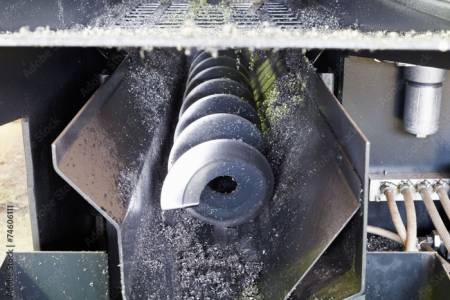Description
Screw Conveying: Efficient & Reliable Material Handling
Screw conveyors, also known as auger conveyors, are highly efficient and versatile machines used for the horizontal, inclined, or vertical conveying of a wide range of bulk materials. They offer a reliable and cost-effective solution for numerous industries, providing gentle yet effective material transportation.
How it Works:
A screw conveyor consists of a helical screw blade rotating within a trough. The rotating screw blade pushes the material along the trough, effectively moving it from one point to another. The design allows for controlled material flow, minimizing damage and degradation. The trough can be constructed from various materials to accommodate different material characteristics and environmental conditions.
Key Features & Benefits:
- Versatile Material Handling: Screw conveyors can handle a wide variety of materials, including powders, granules, flakes, pellets, and even some light, lumpy materials. The material's characteristics (abrasiveness, moisture content, temperature) will influence the design and material selection of the conveyor.
- Gentle Material Handling: The rotating screw blade provides a gentle conveying action, minimizing material degradation and breakage. This is crucial for fragile materials.
- Controlled Material Flow: The speed of the screw and the trough design allow for precise control over the material flow rate.
- Compact Design: Screw conveyors typically have a compact footprint, making them suitable for applications with limited space.
- High Efficiency: They offer high efficiency in terms of power consumption and throughput, compared to other conveying methods.
- Easy Maintenance: Screw conveyors are generally easy to maintain, with readily accessible components.
- Customizable Configurations: Screw conveyors can be customized to meet specific application requirements, including trough length, material, diameter, and drive system. Variations include U-shaped, tubular, and open troughs.
- Various Drive Options: Options include electric motors, hydraulic drives, and pneumatic drives, allowing for flexibility in integration with existing systems.
- Cost-Effective: Screw conveyors provide a cost-effective solution for many material handling applications, with a relatively low initial investment and operating costs.
Applications:
Screw conveying finds widespread application across various industries, including:
- Food Processing: Conveying grains, powders, and other food ingredients.
- Pharmaceutical: Handling powders, granules, and tablets.
- Chemical Processing: Transporting powders, pellets, and other chemical materials.
- Agriculture: Moving grains, seeds, and feed.
- Waste Management: Conveying waste materials.
- Mining & Aggregates: Transporting bulk materials.
Material Selection:
The choice of materials for the screw, trough, and other components depends on the material being conveyed and the operating environment. Common materials include:
- Carbon Steel: For general-purpose applications.
- Stainless Steel: For applications requiring corrosion resistance, often used in the food and pharmaceutical industries.
- Wear-Resistant Steels: For applications involving abrasive materials.
- Plastics: For applications requiring lighter weight and corrosion resistance.
Choosing the Right Screw Conveyor:
Selecting the appropriate screw conveyor requires careful consideration of several factors, including:
- Material Properties: Flow characteristics, abrasiveness, particle size, temperature, moisture content.
- Capacity Requirements: The volume of material to be conveyed per unit time.
- Conveying Distance: The length of the conveyor.
- Space Constraints: The available space for installation.
- Environmental Conditions: Temperature, humidity, and potential for corrosion.
Contact us today to discuss your specific material handling needs and let our experts help you select the perfect screw conveyor for your application.
